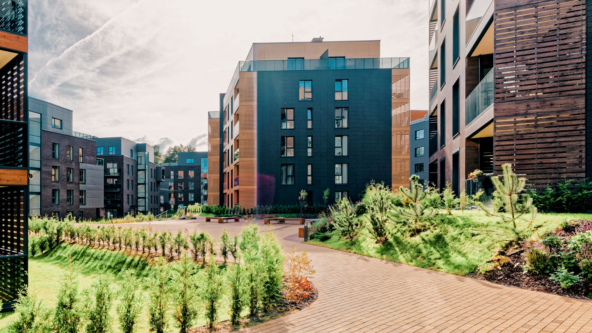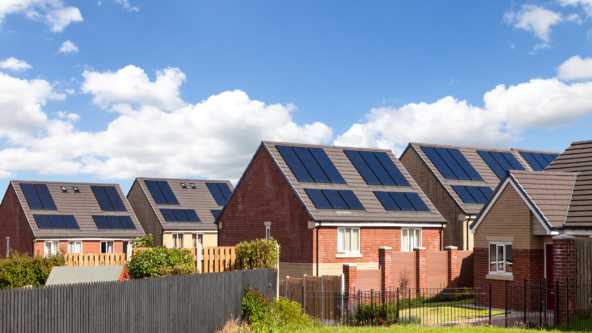Pressure is building for the UK to deliver significantly more affordable housing in the face of rising living costs and fuel poverty. Carbon reduction rules on new and existing homes, an ageing population, and demands set by the government’s levelling-up agenda are all adding to the challenge. Increasingly, housing associations and local authorities are looking for new investment partners and financial models to help them fund affordable homes that are fit for the future.
For many, the cost-of-living nightmare is worsening. Inflation is rampant, with the consumer price index rising 6.2% in the year to February 2022, the fastest rate of increase for 30 years. Chancellor Rishi Sunak’s Spring Statement forecasts average inflation will hit 7.4% this year.
Sunak did deliver some help to low-income families, but was it enough? He raised the National Insurance threshold, cut fuel duty by 5p (but only for one year) and signalled a cut in the basic rate of income tax from 20% to 19% (from April 2024). However, he didn’t cut tax on energy bills.
Recognition of the impact the higher cost of living is having saw Sunak double (to £1 billion) the Household Support Fund that local councils use to help the most vulnerable.
Nevertheless, concern is growing that more needs to be done. The Chartered Institute of Housing expressed its disappointment that Sunak’s statement didn’t do enough to bridge the gap between what low-income households have and what they need. And it described the increase to the Household Support Fund as a “sticking plaster” rather than a solution to support low-income families.
With inflation outpacing earnings, the Office for Budget Responsibility believes real living standards will fall by 2.2% in 2022-2023. That would be the largest annual fall on record. As living costs accelerate faster than wages, the need for affordable housing has never been more pressing. More people are being priced out of the open market for both rental and home ownership, but viable alternatives are in short supply.
Until the UK builds more new homes, house prices will keep rising. So, it was disappointing that the government reported falls in both the number of affordable homes started or completed in 2020–2021 compared with the previous year.
Tackling fuel poverty
Rising inflation and escalating energy prices, in particular, have a greater impact on lower-income families and retired people, forcing them to spend more on day-to-day essentials, especially food and heating.
Although the government’s Energy Bills Rebate, announced in February 2022, aims to soften the blow of higher energy prices, the package of rebates and discounts only goes so far. More needs to be done to tackle long-term fuel poverty by focusing on reducing energy usage in affordable homes, and radically increasing the amount of on-site generation and use of microgrids where possible.
Building greener homes
Energy bills are rising at a time when the world is also targeting net zero carbon emissions. The days of relatively cheap fossil fuels are numbered. The UK must meet renewed commitments made at last year’s COP26 Climate Change Conference in Glasgow. One way this will be done is through the new building regulations, introduced in December 2021, that include the requirement for new homes to produce about 30% less carbon dioxide. To support this change in the rules, the government’s housing and regeneration agency, Homes England, is offering £175 million in green loans to enable small and medium-sized housebuilders to build more high quality, energy-efficient homes.
Building safer homes
Another cost factor facing housing associations and local authorities is the expense of meeting higher safety standards. This applies not only to new-build properties but also to the retrospective step of removing unsafe cladding from buildings following the Grenfell Tower fire.
The government will fully fund the cost of replacing unsafe cladding for all leaseholders in residential buildings of six storeys or higher. Certain buildings below this height can apply for low-interest, government-backed financing to remove dangerous cladding, but there will be cases where costs must be borne by landlords and leaseholders.
Meeting the levelling-up agenda
With the publication of the government’s Levelling Up the United Kingdom white paper in February 2022, we now have a new ‘road map’ that will determine the direction affordable housing takes.
The goal of levelling up should be to narrow the divergence seen across the country in areas such as health, education, and public service provision. For the housing sector, one of the levelling-up goals for 2030 is to give renters a secure path to ownership and to halve the number of “non-decent” rented homes in the UK.
Supporting an ageing population
Affordable housing must also meet the needs of the elderly. In its Housing an Ageing Population briefing paper published in September 2021, the government noted that 19% of the UK’s population was aged 65 or over in 2019 and that this would rise to 24% by 2043. However, the government admits to an absence of a national strategy on housing for elderly people within England to provide a strategic vision to ensure housing, health, and social-care policies are aligned.
But change is coming, albeit slowly. An adult social care reform white paper published in December 2021 budgets for at least £300 million to integrate housing into local health and care strategies, to provide more choices in alternative housing and support options. A cross-department government task force is being set up to focus on housing for elderly people.
Delivering a pipeline of genuinely affordable housing
Housing associations and local authorities have a tough juggling act delivering new genuinely affordable housing while meeting levelling-up requirements and tackling climate-change challenges on their existing stock of homes. Many are looking to institutional and real estate investors to find achievable long-term solutions.
When it is done well, affordable housing investment offers institutional investors the potential to achieve their financial and impact objectives while also allowing housing associations and local authorities to meet their goals.
A key pillar is the fair sharing of risk. One way to achieve this is for investors to act as true, long-term owners of affordable homes, taking occupancy risk rather than relying on lease-wrappers which are increasingly falling out of favour with housing associations and the regulator.
Calls for more genuinely affordable housing are only going to get louder. Currently making its way through Parliament is the Wellbeing for Future Generations Bill. It aims to improve the UK’s economic, social, environmental, and cultural wellbeing. It will be yet another piece of legislation that puts housing centre stage.
Useful insights
Octopus Real Estate and Homes England launch £175m Greener Homes Alliance
We are providing discounted development finance to support housebuilders in the UK to build high quality energy efficient homes.
Octopus Vision
Find out what Octopus are doing to have a positive impact on our planet and its people.
Discover our Future Generations Report
Our Future Generations Report is our inaugural ‘impact’ report, tying together everything we do across the Octopus Group.

Investing with care: The key to resilient returns in the UK care sector

Octopus announces £50m first close of Affordable Housing Institutional Strategy

Closing the gap: Unlocking investment to address the UK’s affordable housing challenge
Consumer price inflation, UK – Office for National Statistics
CIH responds to Chancellor’s Spring Statement – Chartered Institute of Housing
Economics and fiscal outlook report, March 2022
Affordable housing supply in England: 2020 to 2021
Millions to receive £350 boost to help with rising energy costs – GOV.UK
New homes to produce nearly a third less carbon – GOV.UK
Government to bring an end to unsafe cladding with multi-billion pound intervention – GOV.UK
Levelling Up the United Kingdom: Executive Summary
Housing an ageing population: a reading list – House of Commons Library
People at the Heart of Care – adult social care reform white paper
Older people’s housing at heart of levelling up as cross-government task force announced | ARCO
Wellbeing of Future Generations Bill [HL] – Parliamentary Bills – UK Parliament


